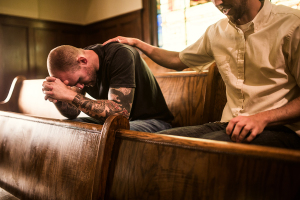Russell Brand just got baptized. But what does it mean?

Activist Russell Brand recently made headlines when he shared on his social media accounts that he was planning on getting baptized. On Sunday, April 28, 2024, Russell Brand was baptized into the Roman Catholic Church.
Brand was previously an actor and comedian, but recently he is a political activist. He has 6.79 million subscribers on YouTube and close to 12 million followers across Instagram, Facebook, and TikTok.
Brand has, up to very recently, promoted many New Age ideas and philosophies across his social media platforms and hosted conferences on meditation and transcendentalism. He has also been a strong proponent of Eastern mysticism and spiritualities that are found in Buddhism and Hinduism. Many in the Christian world are split over whether his most recent baptism and conversion announcements are, in fact, sincere.
One of the biggest issues is that he is still promoting New Age ideas across his social media, and on April 29, he promoted what practically all Christians would define as witchcraft. April 29 is the day after his baptism and he posted a video on his social media involving tarot cards. In the video, he shares the specific meaning of the tarot card he was holding in his hand and that certain symbols can serve as “tools for reflection and personal analysis.” Ending the video, he asks viewers their view on synchronizing other spiritual practices with Christianity and jokingly asks if it is ok to “meddle in the occult arts.”
Some in the Christian world are defending the video, stating that he is “just a baby Christian” and needs discipleship. Then there are others like me who believe that Brand did not convert to Christianity but rather is just adopting certain principles and beliefs into his New Age belief system. As he talked about baptism in another of his Instagram videos, he referenced the idea of “new birth” and becoming an enlightened individual. However, these terms are also present in other religions. They mean something entirely different from the same words within a Christian worldview. Apart from the context of the death, burial, and resurrection of Jesus Christ, these words may be the same but mean something entirely different.
In the past, I have researched Russell Brand extensively and have been aware of his belief system, which is one of universalism and syncretism, or the idea that multiple religions and spiritualities are different roads leading to the same source. And along with that, one can adopt the best practices from each that help them further their spiritual journey. Several years ago, he made headlines for getting a tattoo of Jesus on his arm. In a video on his YouTube channel, he explained why he specifically tattooed a crucifix. However, it was not due to conversion or belief in the biblical Jesus but he explains that he also tattooed Krishna, a masonic number, Hindu Sanskrit, and Ganesha, the Hindu elephant god, on other parts of his body. He appreciated principles and ideas from the story of Jesus without belief in the biblical narrative of who Jesus Christ is and how we must respond in repentance and faith to the Gospel message. At that time, he made it clear that he thought it was a good message, but it just didn't resonate with him.
His most recent social media announcements about baptism and its effects on him did not contain anything pertaining to the biblical Gospel. He did not mention sin, repentance, or the exclusivity of Jesus Christ. He did not renounce his former errant spiritual ideas or practices. Instead, he makes references to tarot cards, Buddhist and Hindu ideas and concepts, as well as keywords that pertain to New Age spirituality. In many of Brand’s past videos, he shared that Jesus is a way to get to God, or what he called the “universal consciousness.” In the past, he stated that he found more interest in other forms of spirituality than Christianity. Now it would seem that he has taken a greater interest in Christianity.
But the problem is that interest in Christianity leads neither to salvation nor true conversion. It is not enough to have an interest in Christian ideals or principles; many atheists, Muslims, Hindus, etc. find some of the ideas of Christianity to be interesting, and some even acknowledge them as valuable and helpful. However, Christianity is not a vehicle for enlightenment or self-actualization, as New Age philosophies present themselves to be. To become a Christian, one must at the very least believe in the exclusivity of Christ and His unique divinity, the sinfulness of man, the need for salvation through the finished work of Jesus on the cross, repentance from sin, and total trust and faith in Jesus Christ. These are prerequisites in the New Testament for someone to be “born again.” Sadly, it seems that Brand does not understand that this is what it means to be a Christian and a follower of Jesus. When listening to his recent videos, it feels like he is adopting some added beliefs that fit him for his current season of life. This is what New Age spirituality often entails. It has a “cafeteria” feel to it.
Christianity, on the other hand, posits that there is truth and falsehood. It posits that any form of spirituality outside of the Bible and outside of trusting in Jesus Christ alone is satanic in origin and a deception.
Tarot cards are a form of witchcraft, the occult, and divination. In the Old Testament, God made it clear the seriousness of any involvement with the occult. It is one of the things that God hates. Deuteronomy 18:10–12 says, “There shall not be found among you anyone who burns his son or his daughter as an offering, anyone who practices divination or tells fortunes or interprets omens, or a sorcerer or a charmer or a medium or a necromancer or one who inquires of the dead, for whoever does these things is an abomination to the Lord. And because of these abominations, the Lord your God is driving them out before you.” Think about that: God actually considers involvement in divination to be on par with child sacrifice. Practicing anything that is witchcraft or divination is extremely serious to God.
Likewise, in Leviticus 20:6, the Bible says, “If a person turns to mediums and necromancers, whoring after them, I will set my face against that person and will cut him off from among his people.” In light of this, it is very serious that Russell Brand is publicly discussing tarot cards and suggesting they can be used in the life of a Christian in order to provide some kind of insight or revelation.
In the Old Testament as well as the New Testament, God’s greatest offense concerning his people was mixture. So often, Israel would worship Yahweh while also worshipping the Baals and Asherahs. This serious issue of blending paganism with true worship of God is seen all throughout scripture, from the worshipping of the golden calf to some of the churches in the book of Revelation being rebuked for their compromise and allowing pagan practices to come in. God does not accept the worship of false gods or the embracing of pagan practices to occur along with true worship. He forbids it. He hates idolatry. But in the Prophets, it is clear that He has an even greater hatred for the mixture of idolatry with true worship than just the idolatry of the pagans. Purity of worship and spiritual practice are highlighted as necessary all throughout the Bible. God never compromises on it or blurs the line.
No one expects perfection out of a new Christian. However, becoming a Christian is more than taking the plunge of baptism. When the Lord saves someone from serious spiritual error and deception, there is no way that He would allow them to continue promoting that deception to millions of followers under the guise that they can be a Christian and participate in what the Bible defines as witchcraft.
David Hoffman is the director and founder of Kingdom Enterprises. Speaking about his leadership of the organization, he says, "Its my desire to lead in a Christ-like fashion, with a servant's heart, and with the confidence and vision of the Holy Spirit. He graduated from Southwestern Assemblies of God University with a degree in Bible and Theology and minors in Biblical Preaching and Philosophy. He is also currently pursing an MA in theology from his alma matter.



























